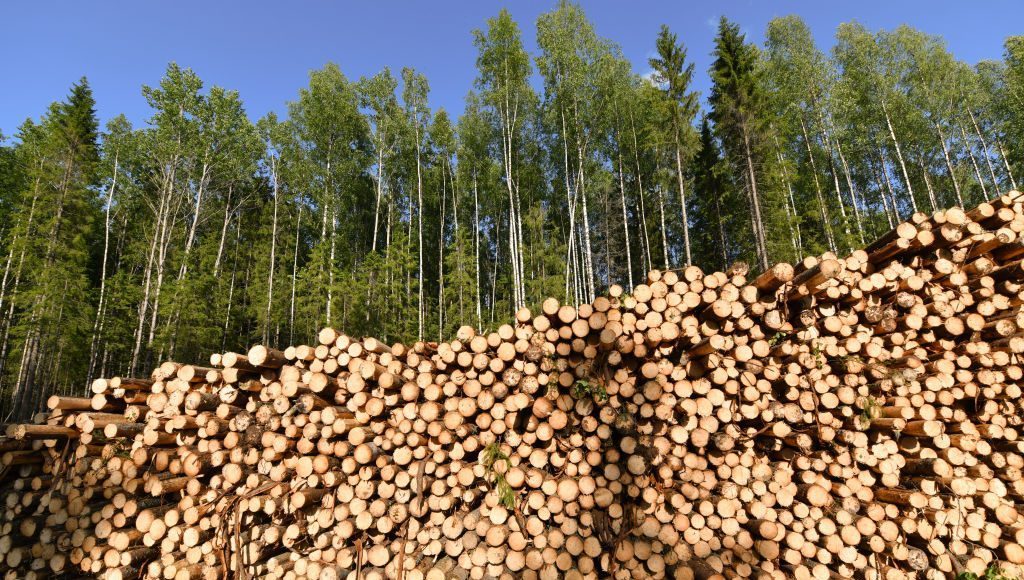Suspect Russian and Belarusian wood is still entering the EU despite wartime sanctions, new data reveals, as several member states push to delay enforcement of the bloc’s anti-deforestation law.
In a letter sent to the European Commission last week, EU member states including Portugal, Estonia, Italy, Croatia, Slovenia, Czechia, Bulgaria, and Poland called for exemptions from the EU Deforestation Regulation (EUDR), which is set to take effect in December.
But new findings from NGO Earthsight show that many of these same countries continue to import birch plywood – a high-value wood product – from China, Georgia, Kazakhstan, and Turkey. These origins have been previously linked to the laundering of Russian timber products since the EU’s sanctions on Russia and Belarus following the former’s invasion of Ukraine in 2022 came into effect.
Earthsight’s latest analysis of new trade data until April 2025 builds on its earlier investigation, published in January, which found EU countries had imported €1.5 billion worth of Russian birch plywood since the start of sanctions in 2022.
In March, the European Commission’s sanctions unit (DG FISMA) warned that Russian and Belarusian timber producers were relabelling and rerouting through third countries to evade EU trade restrictions.
Although Brussels imposed anti-dumping tariffs on Chinese hardwood plywood in June, including birch, NGOs argue the levy does not distinguish between birch and lower-risk hardwood species, and could therefore fail to stop exports.
Between February and April this year, Spain – which has not requested EUDR exemptions – was the EU’s top importer of suspect birch plywood, with shipments worth over €15 million in estimated retail value, Earthsight found. Portugal followed with more than €12 million, while Estonia imported nearly €10 million worth, mainly from Kazakhstan.
However, Poland – the largest importer between 2022 and 2024 – has since significantly stepped up checks, leading to a sharp drop in imports from February this year. Spain’s wood and furniture association has warned that continued Russian imports threaten domestic industry, echoing similar concerns raised by producers in Latvia and Poland.
Eurostat data reviewed by Euractiv shows that prior to Russia’s 2022 full-scale invasion of Ukraine, EU imports of birch plywood from Kazakhstan and Georgia were nonexistent, while imports from China and Turkey were negligible in most member states.
Political momentum
The trade revelations come as political pressure mounts to weaken the EUDR – a flagship EU law aimed at stopping products linked to deforestation from entering the single market.
Last week, the European Parliament adopted an EPP-led resolution rejecting the Commission’s proposed risk classification and calling for a new “no-risk” category for countries with their own deforestation laws.
Russia and Belarus are designated high-risk under the EUDR, but countries like Kazakhstan, China, Turkey, and Georgia – all flagged by NGOs – are currently classified as low-risk, along with all EU member states.
Austrian MEP Thomas Waitz from the Greens group and a forester himself, warned that the no-risk category and a delay in implementation would undermine regime against Russia.
“The EPP needs to show up for Ukraine,” he said, referring to the centre-right European People’s Party (EPP)
Pascal Canfin, the lead negotiator on the regulation for the liberal Renew group, said calls to weaken the EUDR were “a gift to countries like Russia” and undermine EU sovereignty.
The EUDR includes stricter traceability rules than existing timber laws and was designed to close known loopholes. But Earthsight argues that the proposed “no risk” category – backed by 18 farming ministers and the European Parliament – could make EUDR even weaker than current rules.
EPP MEP Alexander Bernhuber, who leads the push to exempt some EU countries from EUDR obligations with the new risk category, said the regulation should not be used to enforce sanctions.
“[Circumvention] is already a criminal offence that must be prosecuted with full force,” he told Euractiv, adding that what is needed are “stricter controls at the EU’s external borders and enforcement of existing sanction regulations.”
“It cannot be the case that with the EUDR we punish those who practice sustainable and responsible forestry,” he added.
(adm, de)
